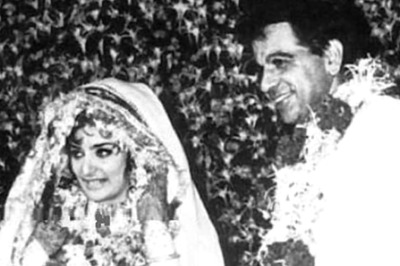
views
Dandwad (Kulgam): Till last month, snow had draped the vast pastoral fields of Dandwad, the last village in south Kashmir Kulgam district, over 130km from Srinagar, the summer capital of the state.
Tucked away in the mighty Pir Panjal range of the Himalayas, this off-track hamlet’s beauty is startling.
A clean stream passes through Dandwad, and bare-brick houses are scattered across the hillock.
This place seems to be disconnected with the rest of the world and close to God.
Hence, children were enthralled when half-a-dozen vehicles carrying polling staff and security personnel drove towards the village, a rare sight for them.
South Kashmir is considered a hot-bed of militancy and Kulgam district is one of the most volatile zones, but this village portrays a contrasting image.
In Kulgam where 90% of the polling stations were marked hypersensitive, some villagers here rushed to the booth on Monday morning to check if the staff there had breakfast. “Some villagers came early in the morning and offered us tea,” said a paramilitary personnel manning the booth.
As voting began, people — young and old, men and women — started pouring in. Soon, a long queue was formed. The paramilitary forces, who were ordered to remain extra-cautious, due to security concerns and possibility of stone-pelting by locals, were surprised.
“We were told that it will be a difficulty duty. The area is volatile and we need to be vigilant. But the people are coming out to vote, they are cheerful and we are relaxed too,” said another paramilitary personnel wishing not to be named.
The villagers say they vote in every election “no matter what happens in other parts”. “You will always find long queues in this village at the time of elections. One who sits at home is looked down upon,” said Javaid Ahmad Dar, a farmer in his late thirties.
How different this village is from the other parts of the district is best described by the numbers. At the time when the polling percentage was recorded around 9% in Kulgam district, here 650 votes were polled out of the total 882, which is over 73%.
This village witnessed a surge of 64% votes compared to other parts of the district. However, if more votes mean anything, this village is not an example.
Locals say they get to see political leaders around election time alone. However, ahead of this election, no major candidate visited, except the Congress nominee, who visited the polling booth and remained in the village for barely five minutes.
Even on the front of the development, this village is as far as it is in the distance. “We have a small dispensary here where one doctor is posted, but he seldom visits us,” said a villager, Basheer Ahmad Dar.
“The nearest hospital is around 20km away. If there is a medical emergency during winters when the village is cover by snow, we have to walk for kilometres to reach the hospital,” Dar told News18.
The road which crisscrosses mountains is filled with potholes. Villagers say it was black-topped seven years ago.
Most of the villagers are farmers and now some young people work as labourers in the nearest town, while some go to Punjab. “For a day of work in town, we are paid Rs 300 and the bus charges us Rs 160 to and fro. What do we eat then?” said Basheer, who also works as a labourer.
Electricity is also a rare sight. In the day, the villagers say, the electricity remains for two to three hours and if there is a fault, the repair happens after weeks.
Mobile phone connectivity is also weak. To make a call, villagers mount a nearby hillock where there is signal. “Despite living in the times of 4G, using the internet here is a dream,” said Auqib Ahmad, who is pursuing his BA from a government college in Kulgam town.
An avid Bollywood watcher, Auqib downloads his favourite movies on the mobile phone, while in college, and then distributes them among the youngsters of the village.
The people of Dandwad have now even changed the name of their village to Gulzar Abad, after the name of local PDP leader Gulzar Ahmad. The villagers think this step might change their fortune.
But villagers do not have much hope from elections. “We cast our vote in overwhelming numbers, but no one is going to come here and change anything for us,” said Basheer Ahmad.
For these people, issues like Article 370, 35A, which have been in the centre of this year’s election in Kashmir, are unimportant. “These issues are too big for us,” said Basheer, with a naïve smile.
The youngsters of this village are hopeful that if this place is developed as a tourist destination, their fortunes will change.
“But it is not the politicians who can develop this place. We want internet and then we can promote this place through social media,” said Auqib.
But why do the locals vote then? “We keep local political activists happy,” said Basheer. “Almost everyone in the village is related to each other here. It is like clan rivalry that attracts us to voting,” he adds.
This picturesque hamlet, unlike other parts of Kulgam, hasn’t seen any gunfight in past, an otherwise daily affair in south Kashmir now. Neither is anyone a militant here.
But people are waiting for a change, whether that happens or not, these people say: “We will continue to vote.”




















Comments
0 comment